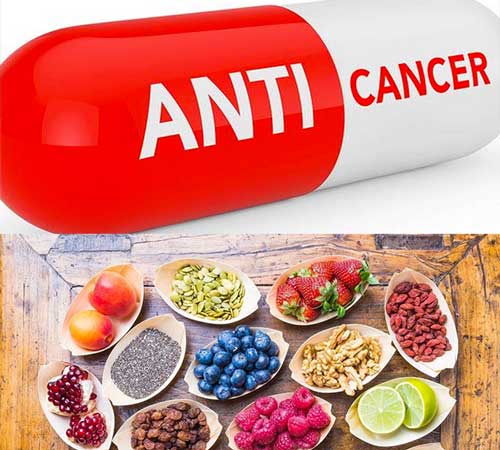Spoiler alert! The following foods have been shown by science and cultural wisdom to fight cancer! Surprisingly, they aren’t necessarily expensive foods, and it can be easy to incorporate them into your diet.
1. Tomato.
It’s a source of health. It reduces the risk of cardiovascular disease, purifies the liver, reduces cholesterol and also contains large amounts of lycopene, a phytochemical responsible for its reddish coloration, and its ability to prevent prostate cancer.
2. Pumpkin.
Like tomato, pumpkin is a great source of lycopene, a compound that enhances the action of vitamins, minerals and fiber present in fruit and vegetables and reduces the risk of prostate cancer.
3. Nuts.
Consuming a handful gives vitamin E, sulphur derivatives, magnesium and phytoestrogens daily, reducing your risk of breast cancer.
4. Berries.
They slow tumor growth thanks to its antioxidant properties that inactivate the points at which carcinogens bind to DNA. Of these, blueberries have the highest concentration of quercitin, one of the flavonoids most studied for their antitumor activity.
5. Salmon
Salmon and other blue fish such as trout, mackerel or sardine are rich in vitamin D, selenium and omega-3 polyunsaturated fatty acids that inhibit free radicals, intervene in the metabolism of estrogen and decrease cell proliferation, by which are good allies against colon, prostate and breast cancer.
6. Broccoli & Cauliflower
Broccoli contains anticancer agents such as magnesium, coumarins and alcaloids. And, above all, vitamin A, which protects against lung, esophageal, larynx, stomach and leukemia tumors.
7. Garlic.
Our grandmothers already knew the antiseptic and antibacterial properties of garlic. We now also know that it contains sulfur derivatives and antioxidants that protect against certain cancers, such as breast, lung and gastric.
8. Whole Wheat and rye.
Fiber from some cereals promotes intestinal transit capable of dragging carcinogenic substances out of the body. This shows the benefits of bread, rice and pasta, assuming they are wholegrain.
9. Turmeric.
Curcumin, the main component of this root that can be taken fresh or dry and ground, is one of the most studied flavones. Its protective effect has been shown in experimental pancreatic and colon tumors and in the cultivation of human cells of brain, breast, esophageal and colorectal cancer.
10. Green tea.
It is known for its antioxidant properties and for being rich in flavonoid polyphenols. It has anticancer properties and acts as a protector against the effects of radiation.
11. Extra virgin olive oil.
Olive oil is the liquid gold from the Mediterranean diet that contains vitamin E and D, as well as polyphenols, with anti-inflammatory and antioxidant properties. The ambitious Predimed (Prevention with Mediterranean Diet) study, conducted over twelve years, concluded that women who take four tablespoons of extra virgin olive oil a day see the risk of developing breast cancer reduced by up to 68%.
12. Apples.
Returning to the popular saying, it is said that an ‘apple a day will keep the doctor away’. Studies suggest that regular consumption of apples may help reduce your risk of oral, esophageal, colon, ovarian, and prostate cancer.
13. The Cabbage family.
One of the most studied tumor inhibitor phytochemical compounds is indoles, whose action prevents DNA ruptures and protects against breast, stomach, liver and prostate cancer. It is found mainly in cabbages, but also in other vegetables such as turnip or watercress.
14. Spinach.
They are green leafy and therefore rich in vitamin E, magnesium and also saponins, whose anti-tumor properties derive from inducing the direct destruction of cancer cells and have immunomodulatory effect.
15. Oregano.
It is rich in phenols, coumarins, lactones and, especially, carvacrol, a phytochemical that, as studied, induces death in prostate cancer tumor cells.
16. Carrot and peaches.
They are an important source of beta-carotene, a phytochemical that helps in the prevention of lung cancer in non-smokers. In the case of peach, in addition, the University of Texas is studying the ability of one of its compounds to selectively fight cancer cells, without attacking normal cells.
17. Citrus
Citrus fruits such as orange, lemon or grapefruit contain significant amounts of alcaloids that inhibit the DNA binding of carcinogens such as benzopyrene. Oranges also contain terpenes, associated, according to the ECC, with the prevention of some cancers.
18. Seaweed
Dark edible seaweed, such as nori seaweed or wakame, the color of which is due to the flucoxatine they contain, have phytoestrogens that inhibit mutations that produce many carcinogens.
19. Mushrooms
Mushrooms, such as Asian ma-take, shitake, enoki or reishi, but also our traditional nickel, contain lentinan, a phytochemical that stimulates the immune system. In experiments, it has been shown to inhibit the growth of sarcomas by increasing immune response.
20. Wine.
Wine has a complex relationship with cancer. The medical community and the AECC recommend reducing alcohol consumption. But wine contains ethanol and polyphenols, which help maintain good cardiovascular health, as well as resveratrol, which reduces the risk of intestinal tumors. The key is moderation, one glass a day




